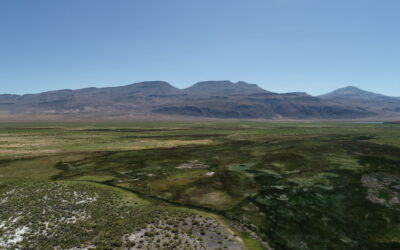Reno, Nev. (Mar. 9, 2021) – Last week, the Nevada System of Higher Education (NSHE) Board of Regents named Desert Research Institute (DRI) scientist Daniel McEvoy, Ph.D., the recipient of the 2021 Rising Researcher Award. This honor is given annually to one NSHE faculty member from DRI, the University of Nevada, Reno (UNR), and the University of Nevada, Las Vegas (UNLV) in recognition of their early-career accomplishments and potential for future advancement and recognition in research.
McEvoy is an Assistant Research Professor with DRI’s Division of Atmospheric Sciences and Regional Climatologist for the Western Regional Climate Center. His research has increased our understanding of land surface-atmospheric feedbacks and evaporative processes on droughts, the connections between drought, climate, and wildland fire, and natural resource management applications of weather, climate, and satellite data.
“It is a great honor to receive this year’s Rising Researcher Award,” McEvoy said. “I look forward to continuing my work in climatology for many years to come.”
Some of McEvoy’s most recent published work describes how changes in evaporative demand (a measure of how dry the air is, sometimes described as “atmospheric thirst”) is expected to impact the frequency of extreme fire danger and drought in Nevada and California through the end of the 21st century. He specializes in using big climate data to create applied climate products such as Climate Engine and the Evaporative Demand Drought Index that can be accessed and used in real-world settings such as land and water management.
During the first five years of his career, McEvoy has given over 60 presentations at national scientific conferences and workshops, published 17 peer-reviewed publications to high-quality journals such as Geophysical Research Letters and Journal of Hydrometeorology, and has contributed to two book chapters. McEvoy has also successfully developed and funded more than a dozen grants and contracts from diverse sources such as the National Oceanic and Atmospheric Administration, California Department of Water Resources, NASA, SERVIR, and Google. These funded projects total more than $3.2 million.
McEvoy holds Ph.D. and M.S. degrees in Atmospheric Science from the University of Nevada, Reno, and a B.S. in Environmental Science from Plattsburgh State University of New York. He joined DRI in 2010 as a graduate research assistant working under advisor John Mejia, Ph.D.
###
The Desert Research Institute (DRI) is a recognized world leader in basic and applied interdisciplinary research. Committed to scientific excellence and integrity, DRI faculty, students, and staff have developed scientific knowledge and innovative technologies in research projects around the globe. Since 1959, DRI’s research has advanced scientific knowledge, supported Nevada’s diversifying economy, provided science-based educational opportunities, and informed policy makers, business leaders, and community members. With campuses in Reno and Las Vegas, DRI serves as the non-profit research arm of the Nevada System of Higher Education. For more information, please visit www.dri.edu.


